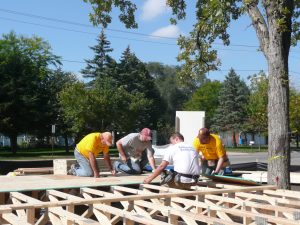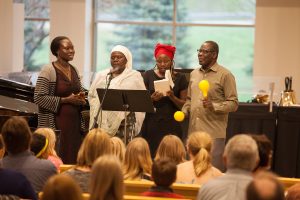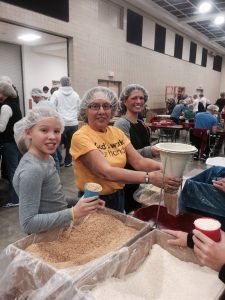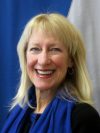What is it like to leave your homeland and come to a place where nobody speaks your language, and everyone looks different from you? They don’t share your customs. They don’t dress like you do. They don’t eat the foods you crave; in fact, you don’t even know where to find the foods you crave that remind you of home.
My kids know that experience, and they didn’t have a choice in the matter.
With hopes that they might have a bright future, their birth-families painfully made an adoption plan for them to have a new home. And then they were accompanied on a journey halfway around the world, from South Korea to Minnesota. We became a family through adoption.
In certain ways, their experience paralleled that of people like my grandparents and the people who formed the congregation I now serve.

Members of Bethlehem Lutheran Church participate in a Habitat for Humanity build in the St. Cloud, Minn., area.
Over 100 years ago, people of European and Scandinavian descent courageously left their homes and everything familiar to begin a new future in a new country. For many, there were no other options. In our community in central Minnesota, the Swedish immigrants arrived first and settled on the east bank of the Mississippi. The Norwegians came a bit later and settled on the west bank. But there was more than a river separating these immigrant people.
Both were minorities in a predominantly German-Catholic community. They organized as Lutheran congregations in order to worship, pray, sing, hear God’s word and enjoy friendships with people who spoke their language. They clustered together to maintain their own distinct cultural traditions and religious heritage. They didn’t mix with other Christians or even with other Lutherans who weren’t of the same stripe of Lutheranism.
And yet, it wasn’t long before these ancestors in the faith realized that, just maybe, God was re-forming them so they could reach out to their neighbors. Ten years into its history, this congregation was nudged to re-imagine their ministries in ways that would enable them to reach out to the young people at the nearby “teachers college” who spoke only English. They prayed and debated and finally made the bold decision to hold worship services not only in Norwegian but also in English – all for the sake of a gospel too good to keep to themselves.

South Sudanese members and lay staff member of Bethlehem Lutheran offering music in worship.
Today, congregations like mine find their communities changing rapidly as new neighbors arrive from across the country and around the world. And once again, we may discover that there is more than a river separating us.
Like our ancestors in the faith, people moving to my area today are doing so in order to begin a new life, work hard, strengthen their families and become a vital part of a new community. Many have lost “goods, honor, child or spouse.” Their first language is not necessarily English. They may find themselves in the difficult situation of trying to nurture a familiar culture, while navigating so much that is suddenly new.
In communities like mine, there are voices speaking fear and judgment in an effort to divide and exclude. Anti-immigrant rhetoric speaks against people like my children. Anti-refugee speech denigrates members of my congregation, my friends and the untiring work of our partner, Lutheran Social Service.
How can we get to know one another as neighbors? How can we begin to build relationships with parents whose kids play on the same sports teams as ours, reach out to have dinner at each other’s homes, and regard each other as “friend”?
If part of our Lutheran legacy has to do with translating the love of God into a language people understand, who is being missed in our communication and in our relationship circles today?
- There are neighbors whose first language is digital communication – which is as transformational for my generation as the printing press was 500 years ago. How can we better utilize the gift of instant communication? What do today’s digital natives know that I need to know? How will God show us new ways to speak among all generations today?
- There are neighbors who do not speak the language of Christendom, people who don’t know what churchy terms like “justification,” “righteousness,” “salvation,” or even “grace” mean. What language will we borrow to speak the love of Jesus and live it today?
- There are neighbors who live every day with the realities that racism and privilege perpetuate. How and where do we as public leaders show up locally to listen, speak up and stand with others? Who are the ecumenical and inter-religious partners with whom we can walk and collaborate in our own communities? What does a “living, daring confidence in God’s grace” look like in this time – for the sake of the world God loves so much?

Members of Bethlehem Lutheran participating in a food-packaging event in the community.
ELCA congregations have the opportunity to live out the gift of freedom in Christ right now and the call to step out as leaders in re-shaping the communities in which God has planted us. In order to do so, God will be up to the things God always does: through the living word, re-forming us, raising us from the dead, setting us free and showing us a future re-imagined.
So, what if we live into our Lutheran inquisitiveness and passion for learning, and attempt to discover more about all the neighbors around us? Instead of asking “Who’s coming here now?”, what if we re-frame the question and ask, “Who is God sending to us today? What gifts and insights do they bring?” In this community, I am so grateful for the Benedictine brothers and sisters who teach, through their example, that “All shall be welcomed as Christ.”
Rather than hunkering down and fearing change, we get to live into a heritage that leads us to pray, “What needs re-forming in us today?” Instead of keeping to ourselves, we have the freedom to ask the missional question, “With whom is our triune God sending us to be in community today?”




